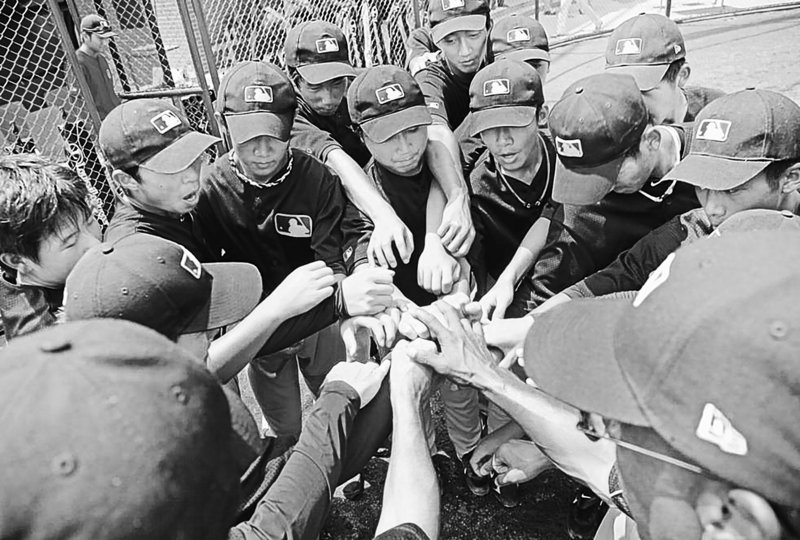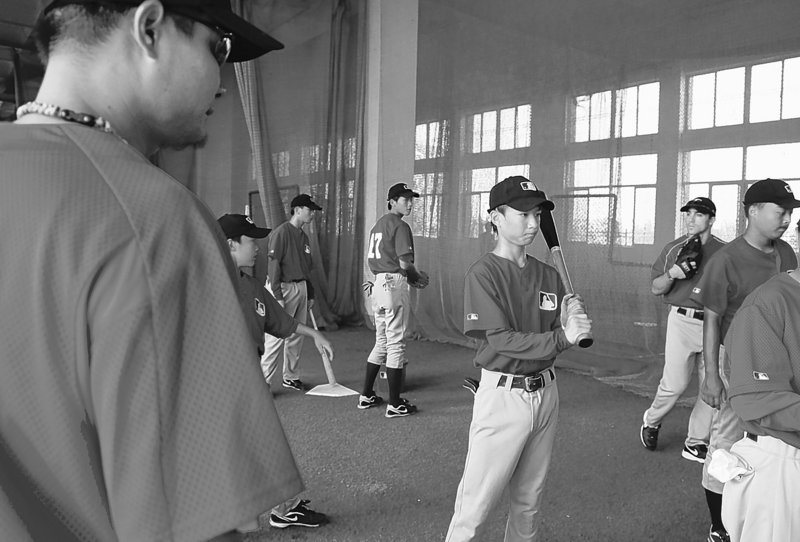It’s five minutes to game time and Li Jiajie is still tinkering with his pitch, hurling ball after ball into a teammate’s mitt, trying to achieve pinpoint accuracy.
Few 13-year-old players in the world have as much invested in their adolescent frames as Li. The new baseball field he will pitch on was built with hard-fought public funding from this working-class town. His uniform and equipment are gifts from Major League Baseball. So is his 72-mph fastball – pieced together by a pitching coach with more than 38 years of experience.
For almost a decade, baseball has been struggling to break into the Chinese market, and much of its strategy now rests on the slender shoulders of Li and a few dozen other adolescent players. In these boys, at this school, lies the future of baseball in China.
To the major league executives who set up this program in the city of Wuxi last year, the boys represent an entire generation of future coaches, sports ministers and players in China’s nascent national league. But the biggest dream is that one day a player from this school will finally make it to the majors in the U.S. and bring with him some of this country’s 1.3 billion potential fans.
The story by now has become almost cliche: Big company sees huge market in China. Big company tries to capture that market before anyone else. But in terms of professional sports, that boat set sail long ago. It was called the National Basketball Association, and, as anyone in here will tell you, its champion was 7-foot-6 star Yao Ming.
An estimated 300 million Chinese now play basketball – roughly the size of the entire U.S. population. This country is the NBA’s largest foreign merchandise market. And when the league launched a separate entity called “NBA China” two years ago, Goldman Sachs estimated its value at $2.3 billion.
That success has left other sports salivating. The National Football League has flown in players (and attractive cheerleaders) to make its case. Professional golf is also making a push. Even World Wrestling Entertainment is trying to sell its spandex-clad, muscle-bound act here.
Far behind the NBA, but somewhere at the head of this second wave, is Major League Baseball. Its officials have adopted a guerrilla-warfare-type strategy – identifying areas where baseball can gain ground at minimal cost and settling in for the long haul. In charge of MLB’s operation is Leon Xie, a former marketing executive.
In a Beijing office seven floors above the NBA but several times smaller, Xie lays out the plight of his sport. Baseball in China stretches back to the late Qing dynasty when students dispatched to American universities by the emperor returned with the game. But baseball was purged during the Cultural Revolution, along with most things associated with the West (except for basketball, which Mao Zedong embraced).
It wasn’t until 2002 – after Beijing won its bid to host the 2008 Olympic Games – that MLB finally got serious about China. As host, China was guaranteed a spot in the Games, and MLB saw its chance to introduce the country to bang qiu, or stickball.
The biggest push, however, has come in the past three years with the establishment of the organization’s Beijing office. Since then, the MLB has created and sent a traveling baseball amusement park around the country. It negotiated a deal to have the sport’s fundamentals taught to more than 150,000 kids at 120 primary schools.
A 2008 survey by market research firm TNS Sport Asia showed that 16 percent of the Chinese population is interested in baseball and 26 percent interested in MLB merchandise. With large followings in Taiwan, Japan and South Korea, there’s already precedent in Asia. And according to the Chinese Baseball Association, 4 million Chinese currently play the game.
Baseball officials admit that’s a drop in the bucket in China’s vast population. Even now, few people off the street know how to play. Equipment is scarce and, with the skyrocketing value of land in China, baseball diamonds are rare.
A bigger problem, however, came with the International Olympic Committee’s 2005 decision to eliminate baseball as an Olympic sport following the Beijing Games. Without medals to win, interest among state sports officials has waned. Even the Olympic stadium that hosted the 2008 Olympic baseball tournament has been torn down.
“There is no short-term fix,” says Paul Archey, MLB’s senior vice president of international operations. “It’s just the nature of the game. We have to start young.”
At the forefront of this strategy is the development center in Wuxi, where 16 boys handpicked by MLB coaches have spent the past year living and breathing baseball.
Most came to the school with less than a year of experience. One boy, Qian Yichen, 13, of Wuxi, had never played the game before.
“It looked so strange, a bunch of people waving a stick around, all chasing such a little ball,” says Qian, who was largely recruited for his lineage of two high-level-athlete parents taller than 6 feet.
His father, Qian Anjun, proudly boasts of his son’s inexperience: “He is like the pure, whitest paper on which the Americans can draw their masterpiece.”
Teaching fundamentals isn’t the tough part, says Rick Dell, a veteran coach. “The harder thing is teaching them strategy.”
To instill such instincts, Dell has built baseball into his players’ lives. Tuition for the high-level academics at Dongbeitang High School is covered, and English-language tutors are provided three days a week. But in their spare hours, the players watch games in their dorms. Translated magazine articles adorn the walls. And a game is always on in the clubhouse that MLB built.
So just how far off is baseball from finding its Yao Ming – a star to bring the Chinese masses to this sport?
“Look, it’s not like basketball. We’re not going to suddenly find a 7-foot player somewhere who can walk into Yankee Stadium and pitch the socks off people,” Dell says.
“Baseball doesn’t work like that. We’re going to have to be deliberate, build it from scratch. That’s what this school is about.”
Send questions/comments to the editors.




Success. Please wait for the page to reload. If the page does not reload within 5 seconds, please refresh the page.
Enter your email and password to access comments.
Hi, to comment on stories you must . This profile is in addition to your subscription and website login.
Already have a commenting profile? .
Invalid username/password.
Please check your email to confirm and complete your registration.
Only subscribers are eligible to post comments. Please subscribe or login first for digital access. Here’s why.
Use the form below to reset your password. When you've submitted your account email, we will send an email with a reset code.